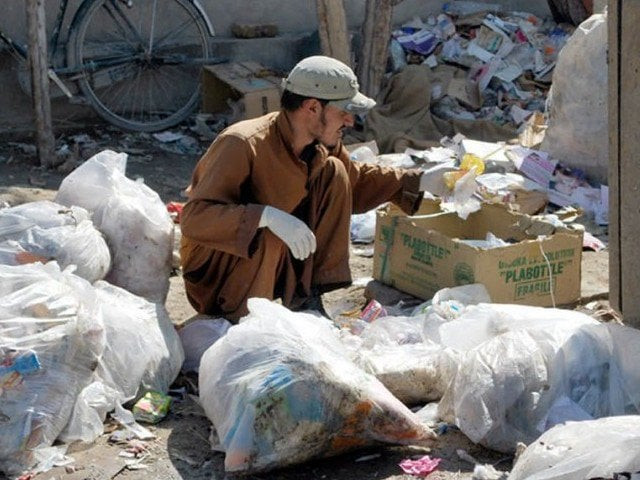Unregulated hospital waste: Capital’s hazardous streams
Govt failed to build recycling plant in capital as recommended by IHC commission

Govt failed to build recycling plant in capital as recommended by IHC commission. PHOTO: EXPRESS
“This is sheer negligence from civic managers and the environmental watchdog who have been silent over this practice by hospitals and laboratories which discharge dangerous chemicals and infected material after carrying out different tests which transport dangerous bacteria and other infectious diseases,” a former official of the Pakistan-Environmental Protection Agency (Pak-EPA) told The Express Tribune on the condition of anonymity.
He said that this infected material is pumped into municipal drainage system which not only pollutes the storm drains and natural streams of the capital, but also contaminate surface and groundwater in downstream areas as well.
“There are hundreds of public and private sector hospitals apart from clinical laboratories in the federal capital who do not have a proper mechanism to dispose of their wastes,” the official said.
In 2015, the Islamabad High Court (IHC) had constituted an independent commission to gauge the gravity of environmental problems in the capital.
The commission had proposed an integrated programme to dispose of solid and hospital waste in the twin cities of Islamabad and Rawalpindi. But two years on, the commission’s recommendations remain unimplemented since a facility to recycle medical and municipal waste — which it had suggested — has yet to be put in place.
According to the commission’s report, Islamabad generates over 1,200 tonnes of solid waste every day. However, owing to a lack of proper landfill sites, solid waste was being dumped at open sites.
“Unattended, openly dumped waste, especially under warm and moist conditions, becomes an ideal breeding place for disease-causing organisms. These badly managed heaps of waste are time bombs which can cause serious health hazards,” it said.
A German firm, which had signed an agreement with the Climate Change Ministry in May 2016 to build the facility, reportedly pulled out.
“The German firm had pulled out after accepting a larger project in Saudi Arabia,” former director-general of Pak-Environmental Protection Agency Asif Shuja explained to the Express Tribune.
“Currently, nothing is being done to install a recycling facility for hospital and hazardous waste,” he added.
The Capital Development Authority (CDA), being the premier civic manager has little expertise in building and operating such facilities. The local government set up, the Islamabad Metropolitan Corporation (IMC), lacks the capacity to deal with even basic civic issues.
In the absence of a scientific method or a treatment plant, all hazardous waste is currently dumped into drains along with other untreated household waste. This has serious implications on health and the environment.
Meanwhile, the CDA and IMC still undecided over the development of a landfill site for disposing of solid waste in the capital.
Currently, the CDA only provides door-to-door collection service for residential and commercial buildings in Zone-I, while waste from the remaining zones is unregulated.
As a result, waste is dumped in different streams causing different infectious and fatal diseases, such as hepatitis, to spread downstream.
Published in The Express Tribune, October 30th, 2017.



















COMMENTS
Comments are moderated and generally will be posted if they are on-topic and not abusive.
For more information, please see our Comments FAQ